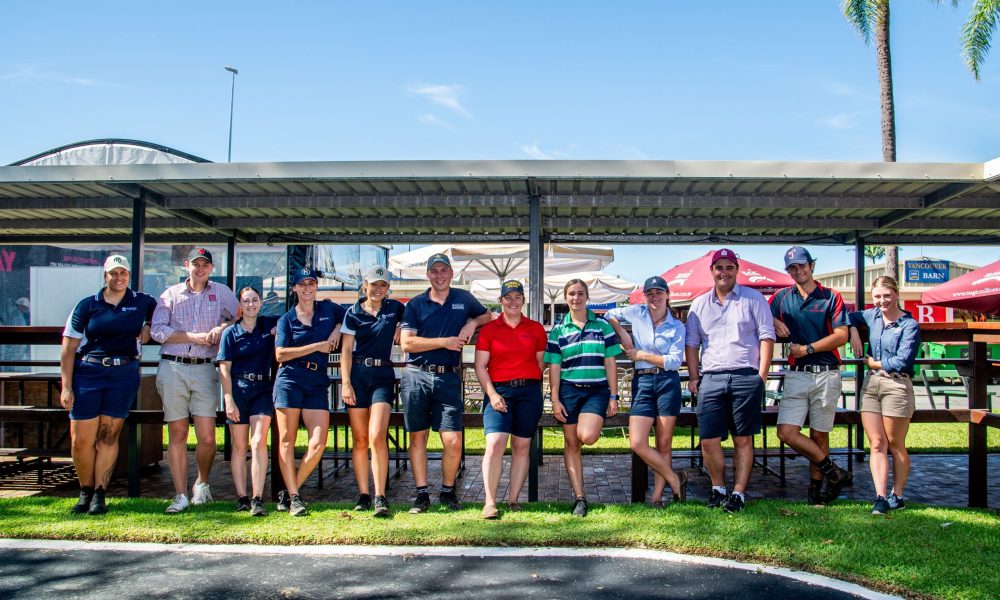Fast Track applications are open!

A new wave of young horse lovers will begin their journey into the breeding industry from today when Thoroughbred Breeders Australia (TBA) opens applications for the latest intake in its Fast Track training program.
Now in its seventh year, Fast Track has proven a successful pathway into thoroughbreds – and a much valued response to the sport’s infamous staffing shortages – with some 90 per cent of trainees still working in the breeding industry after graduating.
The 12-month course targets people from outside breeding and racing, giving them the foundation from which to build their careers. After a month of introductory training at Scone TAFE under seasoned industry professional Mia Collins, trainees begin full-time paid traineeships with stud farms while studying for their Certificate III in Horse Breeding – a nationally recognised formal qualification.
The trainees return to TAFE for two more weeks towards the end of the breeding season to learn more about handling young horses, to further their experience with yearlings, and help them gain a thorough knowledge of the breeding industry before the final aim of graduating to full time employment.
Last year’s intake was the largest yet for the course, with 18 trainees undertaking placements in Victoria, New South Wales, Queensland, Western Australia and Tasmania. Up to 20 more will be accepted into Fast Track this year.
With a particular emphasis on bringing in new industry participants, Fast Track’s graduates include people who had previously worked as an electrician, a beauty therapist, a cricket coach and an army veteran.
“The success of the course is around the graduates,” says TBA CEO Tom Reilly. “To see one graduate who’s gone from working in a fast food outlet in South Australia, to leading Exceed And Excel around at a Darley stallion parade, that’s a pretty remarkable journey for someone in only a couple of years.
“There are many examples like that. I walked around the Magic Millions sale last month and it was great to see so many of our past trainees working for farms, preparing and leading yearlings into the sales ring, many of whom had had no experience with horses before our program.
“And it’s testament to the program that so many have stayed in the industry after graduating.”
TBA’s education and projects manager Madison Tims is keen for the program to continue to grow, and is calling for anyone interested to get in touch.
“It was really exciting to have our first ever trainees based in Western Australia and Tasmania last year, and we are very keen to keep expanding the numbers on the course and have more farms involved in mentoring people,” she said.
Abi Wheatland, 22, was the aforementioned South Australian Hungry Jack’s employee who entered Fast Track in 2021. After completing her 12-month traineeship in her home state with Cornerstone Stud, she stayed on for another season post-graduation, then switched to the Hunter Valley where she’s now employed full time working with Darley Kelvinside’s stallions. She also worked last month’s Magic Millions sale with Vinery, to gain more experience with yearlings.
“I definitely think if you’re young, like horses, and you’re not sure where to start, Fast Track is an incredible opportunity to get a foot in the door of the industry,” Wheatland told ANZ Bloodstock News.
“That first month at TAFE, if you haven’t come from a horsey background, is great. You learn the basics, from putting on a halter, to danger zones, horse behaviour, nutrition, the breeding cycle.
“And then to be able to study for your Cert III with the security of a full time wage is really good. You go through the whole year – foaling down, getting mares in-foal, watching covers, on to weaning, then yearling prep; you see and learn the whole 12-month cycle.
“There’s so many paths you can take in the industry. And then also, it’s got to be one of the easiest industries to go and get work overseas as well.”
The high regard for the system runs both ways, with Bhima Thoroughbreds’ Kate Fleming calling Fast Track “a great way for both the young people to get a taste of the industry and for farms to gain new employees”.
“Without programs like Fast Track, finding, training and bringing young staff into the industry would be much more difficult,” Fleming said. “I’d absolutely encourage farms to get involved in the program.”


